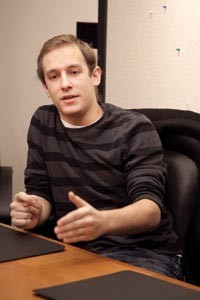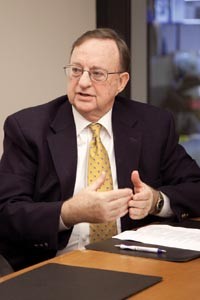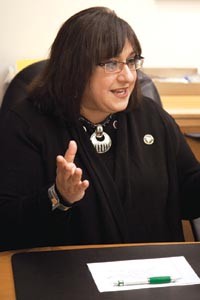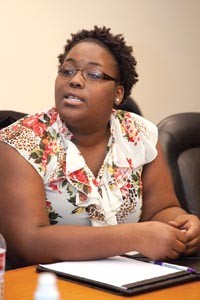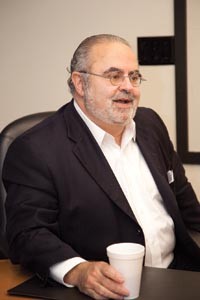Since November, city politics have been dominated by Mayor Luke Ravenstahl's 1 percent "Fair Share" tax on tuition for all students attending post-secondary schools. The tax -- most of whose estimated $16 million in proceeds were slated to help pay off the city's longstanding pension debt -- has been strenuously opposed by colleges and students.
As this issue was going to press, Ravenstahl announced that the tax would be tabled after an agreement was reached between the cities and universities. Although he didn't release figures, Ravenstahl announced that the University of Pittsburgh and Carnegie Mellon would make contributions to the city larger than any they've made in the past. (Health insurer Highmark also agreed to make record contributions.) Universities, the insurance companies and the private sector -- led by Duquesne Light -- also agreed to begin lobbying Harrisburg for a new revenue stream to find a permanent solution for the pension problem.
Even with that detente, however, the episode has been revealing. It suggests that city leaders are willing to take on large nonprofits, which number among the city's biggest employers, to help shore up city finances ... and that the mayor is willing to act no matter whom he ticks off.
Does the tax debate mark a new phase in negotiating with large nonprofits? (There are still questions about whether and how UPMC will be brought to the negotiating table, for example.) And will those negotiations be more diplomatic ... or will they feature tactics similar to those used by pirates off the Somali coast?
On Dec. 14, City Paper convened a panel of five locals to talk about the tuition tax: how it was handled, what the debate could mean for the future -- and what legacy the tax could have, even if it never generates a cent. The panelists:
Aaron Gross is a Carnegie Mellon student and chair of the Undergraduate Student Senate. He has been at the forefront of student protests.
Jake Haulk is an economist who received his Ph.D. on the subject from Duke University. He is the president of the Allegheny Institute, a conservative think tank.
Pittsburgh City Councilor Theresa Kail-Smith, a West End community activist now serving her first term on Grant Street, is one of five councilors who has expressed support for the tuition tax. But she has also been facilitating discussions between the city and local universities.
Amber Phillips is studying social work at Chatham University. Originally from Columbus, Ohio, she is also the Class of 2012 president.
Joseph Sabino Mistick is a Duquesne Law professor and columnist for the Pittsburgh Tribune-Review. He also worked in the administration of former Mayor Sophie Masloff.
City Paper: Councilor Smith, the tuition tax has been called a lot of things, including a blackmail attempt to get universities to come to the table. How do you view it?
Theresa Smith: This came about, to my knowledge, as fees that Councilwoman [Darlene] Harris had wanted to propose. Following that, the mayor came out with this idea of a tuition tax. I want the nonprofits to pay [for city services], but everyone has always seemed to target UPMC, and I'm pretty confident that they're the ones that have paid the most [into a voluntary fund that has contributed to the city's operations in recent years, though the size of those contributions is not disclosed publicly]. Instead of targeting UPMC, we need to look at other nonprofits like Highmark, because UPMC has been contributing. You can't write off the Pittsburgh Promise [scholarship program, which UPMC has supported with a $10 million pledge] -- it does mean a lot to people with children in school.
Joseph Sabino Mistick: Here's my take. If you are a nonprofit and you want to be tax-exempt, you should act like a nonprofit. That means you should meet the mission that the government has asked you to meet in exchange for making you tax-exempt. I don't think UPMC does that. They make hundreds of millions of dollars in profits. They are way beyond what they need, and I think they need to step up to the plate. They do other good things in the community, certainly, but they also act like a for-profit entity in a lot of ways. To the extent that they want to act like that and not be accountable to the community, I think they should be taxed.
CP: So, do you think there were other entities that should have been called on before the universities?
Mistick: In the early 1990s, [the Masloff administration] negotiated with them all. We went after the hospitals and the universities. We generated a fair amount of revenue, and we quickly found that we could attract a lot more bees with honey than we could with vinegar. I think this [tuition-tax] approach is just wrong-headed. You can't bludgeon these major institutions into paying some sort of fee.
Jake Haulk: My problem is that we haven't done the work to decide whether the nonprofits really need to be assessed anything. You need someone like Rand [a nonprofit think tank with a Pittsburgh office], to evaluate what the real contributions of the hospitals and the universities are to this city. They are the horses the city is riding right now, and I don't know that it's in the best interest of the city to go after these entities. These schools are this city's major selling point.
Aaron Gross: I think another thing that you have to think about [is], if I were a university president and this was the way that the city chooses to try and get me to the negotiating table, that bridge has been burned.
Smith: Everyone has been telling us that this is not the way to do business, but I want to make it clear that we have tried before the tax was on the table. To say that this mayor has not handled it properly ... I know that he has tried.
Mistick: Councilwoman, you've tried to work with everyone on this. But I think it's common knowledge that there's no relationship with this mayor and any of the institutions in this town. This is what that has wrought.
Smith: Common knowledge to whom? That's an assumption. I have been in [Ravenstahl's] office while he has made calls to university presidents.
CP: In any case, the city's financial overseers are demanding that it come up with $15 million a year for additional pension payments. Where should it get the money, if not from the schools or other nonprofits?
Mistick: When I worked in the Masloff administration, I could walk in the office any morning, go to our finance guy and say, "We need $15 million." And by lunch, he'd have identified $15 million [in potential cuts]. These guys have done nothing to cut costs and [they need to] consolidate some services with the county. Until they do that, I don't think they should be leaning on people to pay more.
Haulk: The city has underfunded its pension and taken on huge amounts of debt. Why should college students be saddled with covering pension costs? The voters approved those pension plans; the students didn't. The costs should go to the people who incurred them. You can raise $5 million pretty quickly with a minor increase in property taxes.
Mistick: You could do that with merging just a few services [with county government], like purchasing. But [Ravenstahl] won't do that because he doesn't want to give up access to the vendors come election time.
CP: Amber, what was it about this tax that got you involved with protesting?
Amber Phillips: I've always been politically active, especially in my hometown of Columbus, Ohio. I feel like this called me out to get more involved in Pittsburgh's politics. We were represented as students who burn couches, students who don't contribute their fair share. The way the mayor presented this was completely wrong. We worked very hard to get here. Our tuition is high -- a fact that has been used to try and turn us against our universities -- but we also know that without this education, our futures will be limited. I think we're being held hostage by two groups and it has nothing to do with the students. No one came to talk to us about this.
Gross: I think the problem is we've all gone too far here. I think the mayor and the city have gone too far to step back and say, "Obviously, we're not going to see a penny of revenue from this tax, but we've just gone too far and can't step back."
Smith: I do agree with you that everyone has gone too far, and it's not just the mayor. PCHE [the Pittsburgh Council on Higher Education, which represents local colleges] has done the same thing and so has council, to be honest. I really want to see everyone come together and work this out.
CP: Why do you think that colleges aren't taking a bigger PR hit for not paying into city coffers?
Gross: I think they're not taking a public-relations hit because, to an outside observer, this looks like the city reaching out to grab money that it doesn't need or deserve.
Mistick: The guy who holds your child hostage is never going to be the sympathetic character.
Smith: But I also think the universities are holding their students hostage. They could just pay this fee and they could work with the city.
Mistick: If the relationships had been properly cultivated with the universities, we wouldn't have this problem. But you can't come in at the last minute, break down the door and say, "I want your money."
Haulk: Let me say something about the relationship between [Pitt Chancellor Mark] Nordenberg and the mayor. Now, this is surmised, but Nordenberg headed up a commission that went on for 18 months to figure out ways for the city and the county to work together. They came up with a plan that called for major consolidation of county and city services to save millions and millions of dollars, and then to eventually move to a merged, city/county government -- which we all know will never happen. But the merging of city and county services is entirely doable. And at this point, the next service to be merged will be the first, and that's two years after that study because the city will not participate.
Smith: So that's why we're here now? Because of some suggestions that weren't followed?
Haulk: They don't want to give $5 million now because they have no confidence that $5 million will ever be enough.
Smith: Well, there are a lot of questions about how nonprofits spend their money. It works two ways.
Mistick: I admire your attempt to defend this mayor ...
Smith: I'm not trying to defend the mayor. I'm trying to defend this city.
Gross: If you really want to move forward from this, just step back and say, "I'm sorry, this was a bad idea, and we're going to abandon this and work constructively with the universities."
Smith: But I think everyone involved has to come forward and admit that they handled this poorly.
Gross: Fair enough, I do agree with you.
Smith: Except for the students. I have a lot of respect for the way they've represented themselves through this.
Phillips: The students don't want to fight, but we're upset over the way that we have been treated over this issue. I know several council members said they have children that are in college. Just take a step back and look at all of the students who are in school with them, struggling and working so hard to be here. For our futures in this city to be put on such shaky ground because of a poor relationship between the city and the nonprofits is just not fair.
Smith: I understand what you're saying, but I also want you to put that same expectation on the universities.
CP: Joe, while you don't seem to be for this tax, you have written in your [Tribune-Review] column many times about nonprofits paying their fair share.
Mistick: Anywhere from 40 to 70 percent of the land mass in the city of Pittsburgh is tax-exempt. Because of the success of the "eds and meds," that amount of tax-exempt property is growing. There are some models where a certain amount of tax-exempt property triggers revenue from the commonwealth. So you need to create some device from the commonwealth to do that. But Pittsburgh isn't alone: Everyone is struggling.
Haulk: The city would be in a lot stronger position if they hadn't created Heinz Field, Carnegie Science Center, PNC Park, a new convention center that gobbled up a tremendous amount of space and a huge new hockey arena that have taken valuable Downtown property off the tax rolls. To be fussing about CMU, which has been there for a hundred years, when you're taking valuable property off the tax rolls ...
CP: Theresa, what do you see as council's role in collecting contributions from all nonprofits, not just the universities?
Smith: I'm anxious to work with the nonprofits to try and figure out a solution to this problem long-term. And when I say nonprofits, I do mean the universities and I also mean the Catholic Diocese. Joe, I know you work for Duquesne [a Catholic university], but I think the diocese has a lot of valuable tax-exempt property as well.
Haulk: I do hope cooler heads prevail. Theresa, I really believe you should go back to council and say, "Let's get Rand or some other independent group to do a thorough study of what the nonprofit contributions to the city are." You can get a very objective study done and maybe you get the universities to kick in $20,000 apiece to pay for it. This could be a wonderful thing to have: an independent group to say, "This is what the nonprofits contribute to the city in terms of jobs and payroll tax, property tax, sales tax and the amusement tax, etc." And make the agreement that individuals will live with the results. I honestly believe that if the universities find that they are a net drain on the city, then they would step up immediately and help out.
Gross: The idea of a Rand study is very interesting. If I were a university president, I would certainly agree to that. And I think if we can put this behind us, then the city and the universities can begin moving forward and working together constructively.
Phillips: I agree. I think an apology needs to be made to the students. A lot of us are considering leaving the city to finish our schooling. I want to stay here and go to grad school here. But with this on the table and the way we've been treated, it has forced me to reconsider those decisions.

